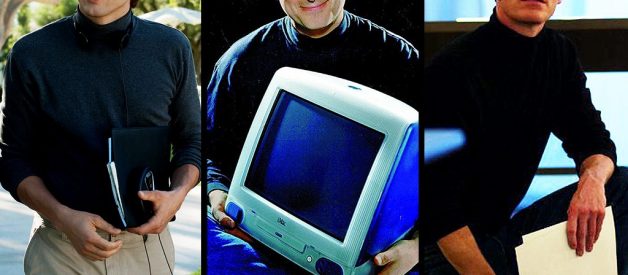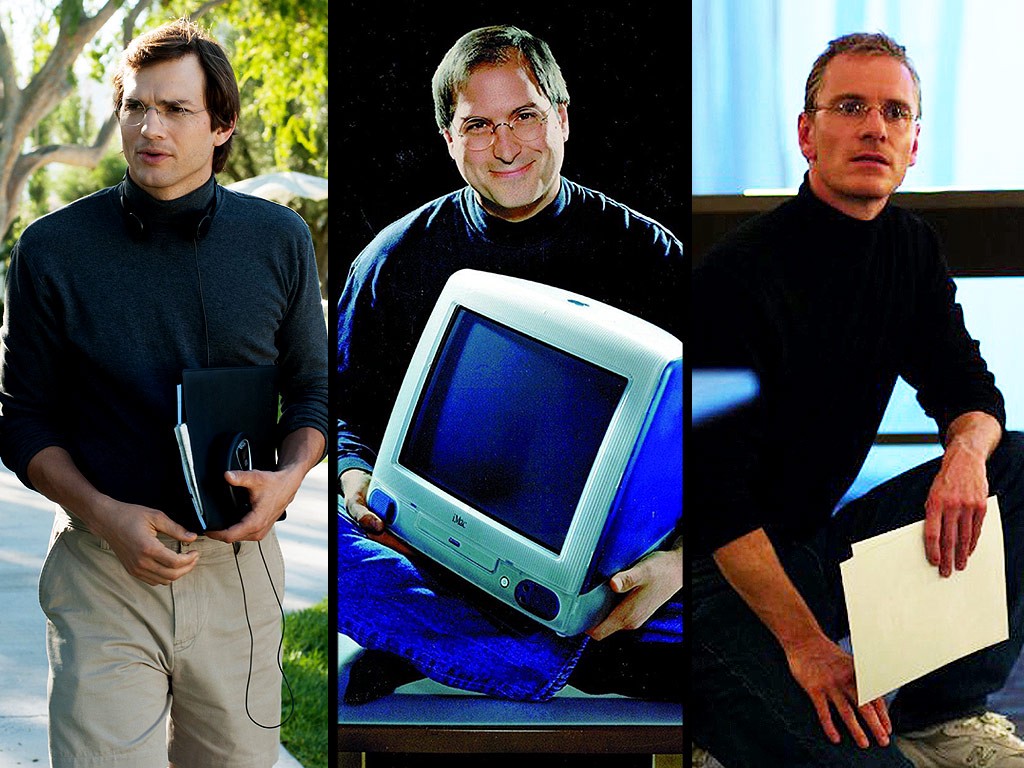
Let me tell you what I wish I?d known
When I was young and dreamed of glory
You have no control
Who lives, who dies, who tells your story
? ?History Has Its Eyes On You?, Hamilton by Lin-Manuel Miranda
The lyrics above, sung by George Washington (Christopher Jackson) to his young protg Alexander Hamilton (Lin-Manuel Miranda) in the hip-hop musical Hamilton, expresses one of the show?s central themes: legacy. The ambitious Hamilton endeavors to write and accomplish as much as he can as fast as he can, obsessed with the legacy he will leave behind. But Washington, already a living legend in spite of his many mistakes, knows the truth ? no matter what you do and how hard you try, your legacy and your place in history will be determined by others, and probably long after you?re gone.
Steve Jobs, the iconoclastic co-founder of Apple and arguably the person most responsible for the way humans interact with technology today, died of pancreatic cancer on October 5, 2011 at the age of 56. But with Jobs? illness and his reduced role at Apple being announced years earlier, people had already begun their attempts to record, define, and shape his legacy. Some did it out of reverence, respect, or for posterity, while others were driven by profit, spite, or to give their spin on a man, company, and products that could be as divisive as they were influential. Even though he tended to avoid dwelling on the past, even Jobs, perhaps sensing that his time might be cut short, attempted to leave a definitive account of his life, giving author Walt Isaacson unprecedented access to himself and those close to him for what would eventually become the best-selling biography simply titled Steve Jobs.
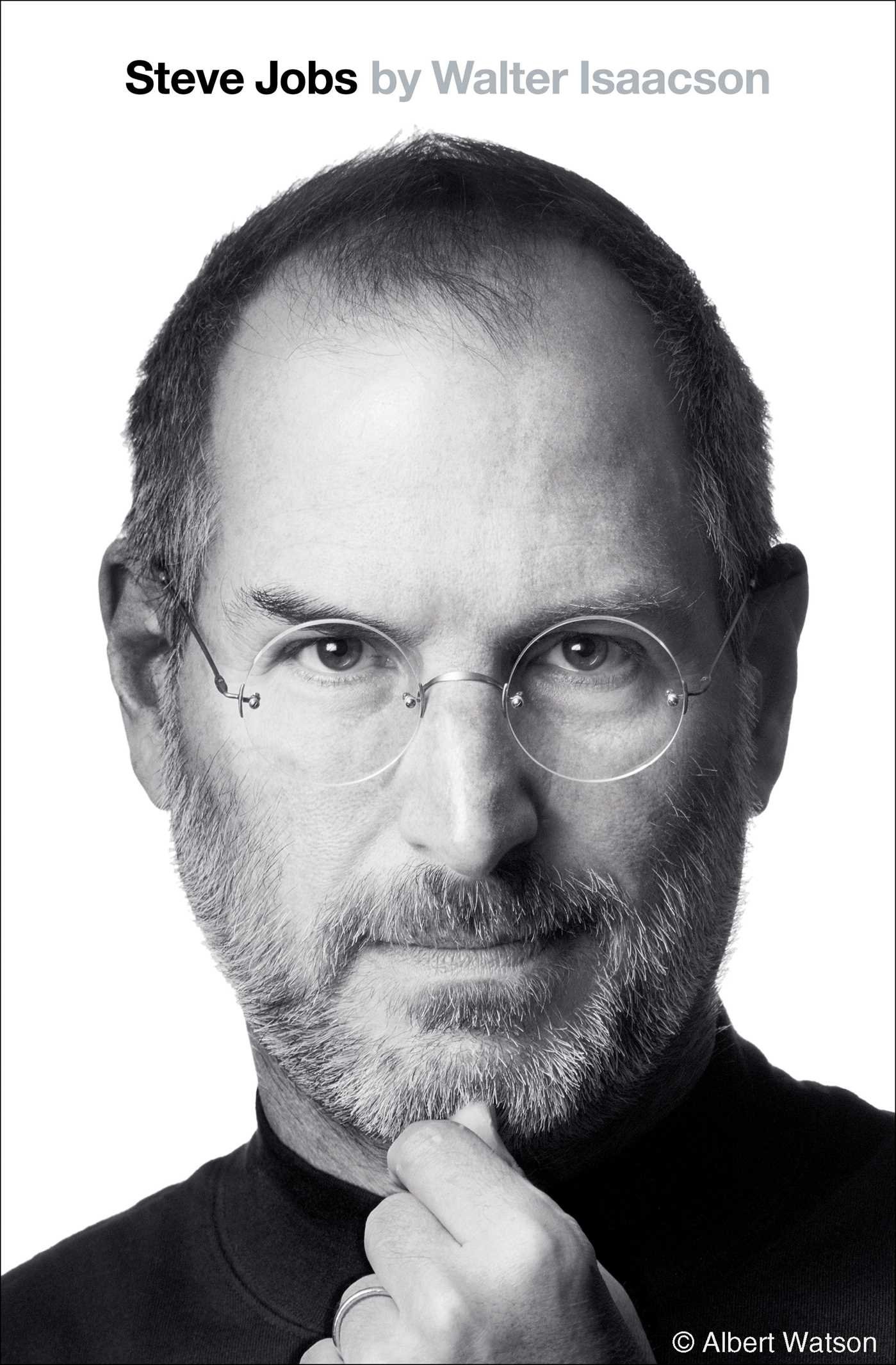 Cover of ?Steve Jobs? by Walt Isaacson
Cover of ?Steve Jobs? by Walt Isaacson
As a movie critic and longtime Apple user, I?ve been particularly interested in the attempts to capture Jobs? life and legacy in film. Of course, there are many more books about Jobs ? including comic books and even a biography aimed at kids ? but movies, as one of the most powerful storytelling tools ever created, are popular entertainment aimed at the masses who would never consider reading a 656-page book like Isaacson?s. Movies need to be more focused and condensed considering the constraints of a digestible running time, where deciding what gets left out can be just as important as what makes it to the screen. However, this can also lead to the oversimplification of a complex subject, as well as the magnification of the filmmakers? biases towards it.
My last post looked at the biases of tech reviewers and commentators towards Apple products and their fans, and it got me thinking about some of the more prominent films about Jobs, what they left in or out (or simply made up), and the biases or limitations those decisions reveal. So I decided to revisit my reviews of three movies that attempted to sum up the life and work of Steve Jobs: Jobs (2013) starring Ashton Kutcher, Steve Jobs (2015) with Michael Fassbender, and Alex Gibney?s 2015 documentary Steve Jobs: the Man In the Machine.
JOBS (2013)
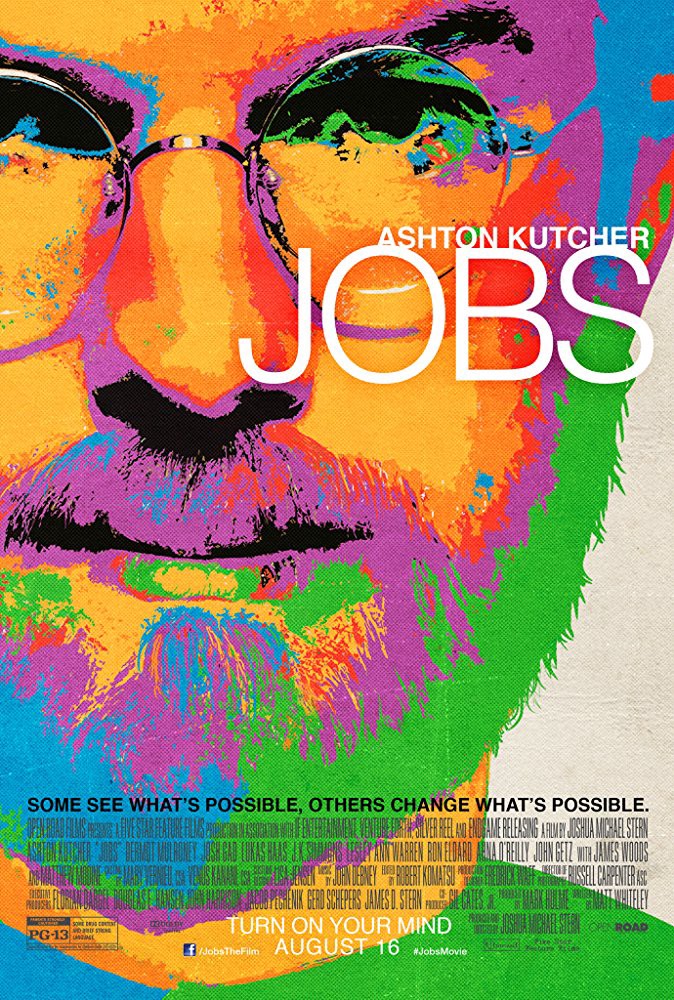
Director: Joshua Michael Stern
Writer: Matt Whitely
Ashton Kutcher as Steve Jobs
Trailer
With its casting of Ashton Kutcher as Steve Jobs, Jobs was doomed from the moment it was announced. Despite being an Apple enthusiast and a legitimate tech venture capitalist, no Apple fan wanted to see a pretty-boy actor best known for playing dopes in That 70s Show and Dude, Where?s My Car? in a serious role playing an icon like Jobs. Having a director (Joshua Michael Stern) with only two feature credits, the biggest of which was the Kevin Costner political comedy Swing Vote, also didn?t help. But maybe the biggest shadow looming over Jobs was that Sony had already announced that Aaron Sorkin, an Oscar winner for his The Social Network screenplay and considered one of the best writers in Hollywood, would be writing a Steve Jobs screenplay based on Walt Isaacson?s biography, which would be sure to attract A-list talent. It made Jobs seem like a bush league, unserious attempt not worth wasting time or money on.
Surprisingly, the biggest problem with Jobs isn?t Kutcher, who brings a lot of intensity to what is probably the best performance of his career so far (which might be faint praise considering Kutcher?s filmography). Kutcher is also well-supported by a cast that includes Josh Gad, Lukas Haas, Matthew Modine, and J.K. Simmons. The real issue with Jobs is a problem that many biopics suffer from: trying to do too much. By attempting to cover so many chapters in Jobs? life, starting from his college years at Reed College and ending with his triumphant return to Apple in 1997, Jobs doesn?t handle any of them particularly well or thoroughly enough. Maybe this has something to do with the fact that Jobs was the first (and apparently only) screenplay from writer Matt Whiteley. In any case, Jobs was panned by critics and made just $16.1 million domestically against a $12 million budget.
Read (or watch!) my full review of Jobs here.
STEVE JOBS (2015)
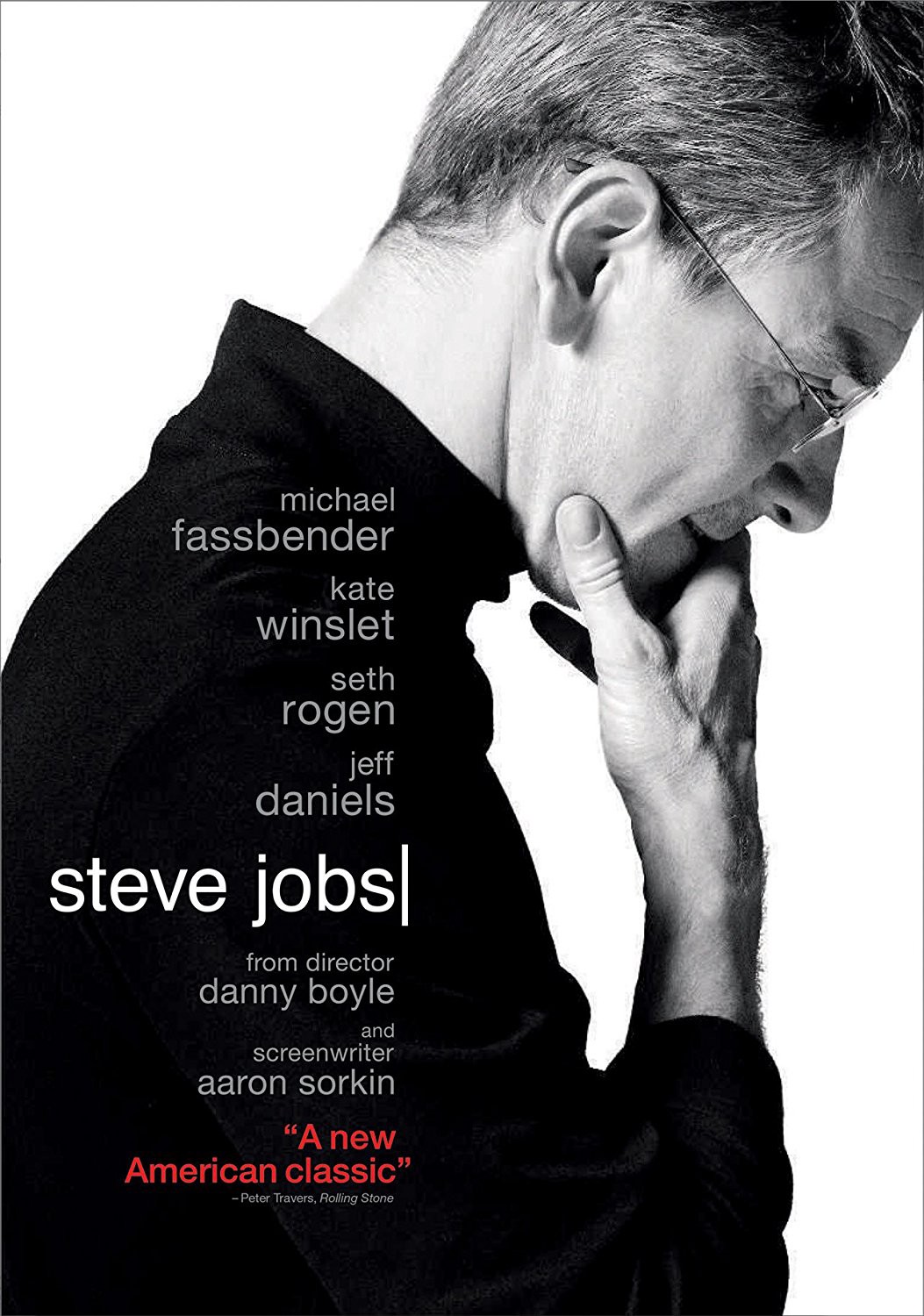
Director: Danny Boyle
Writer: Aaron Sorkin
Michael Fassbender as Steve Jobs
Trailer
This was the Steve Jobs movie Apple fans thought they were waiting for, though that enthusiasm would be significantly dampened before the movie even began shooting. First, there were Sony?s problems with keeping a director (Fight Club?s David Fincher was in and out) and casting the role of Steve Jobs (Christian Bale and Leonardo DiCaprio were frontrunners before the considerably less famous Michael Fassbender landed it). Then there was the revelation that Steve Jobs would have a very unusual structure, broken into three 40-minute vignettes playing out backstage in real time before the unveiling of the original Macintosh (1984), the NeXT computer (1988), and the first iMac (1998). What the hell was this movie going to be?
Even though it feels much more like a play than a movie, I enjoyed Steve Jobs overall, with its strong performances, sparring personalities, and the crackling, fast-paced dialogue Sorkin is rightly famous for. But to enjoy the movie, one needs to immediately abandon the idea that Steve Jobs bears anything more than a passing resemblance with the real Jobs and what really transpired, starting with the bonkers idea that someone like Jobs ? or really anyone about to give a high-stakes presentation to an auditorium full of people ? would spend the precious minutes before going onstage arguing with everyone, attempting to settle personal scores, or negotiating childcare payments. There?s also silliness like Steve ?Woz? Wozniak (Seth Rogen) being angry that Jobs won?t recognize the hard work of the team that designed the Apple II in 1977 during a keynote in 1998, or the pat, pop psychology explanation that Jobs? desire to control both the hardware and software of Apple products stemmed from the lack of control he felt about being adopted. When it comes to filmmaking, I?m definitely a believer in the idea that you shouldn?t let the facts get in the way of a good story, but it seems very strange to buy the rights to Steve Jobs? authorized biography, name the movie after him, then make a movie full of totally fictional interactions that plays so loosely with the facts.
But in the end, not many people cared. Steve Jobs made just $17.7 million domestically with a $30 million budget, though critics mostly liked it and Fassbender and Kate Winslet (as Apple/NeXT marketing executive Joanna Hoffman) earned Oscar nominations for their performances.
Read my full review of Steve Jobs here.
STEVE JOBS: THE MAN IN THE MACHINE (2015)
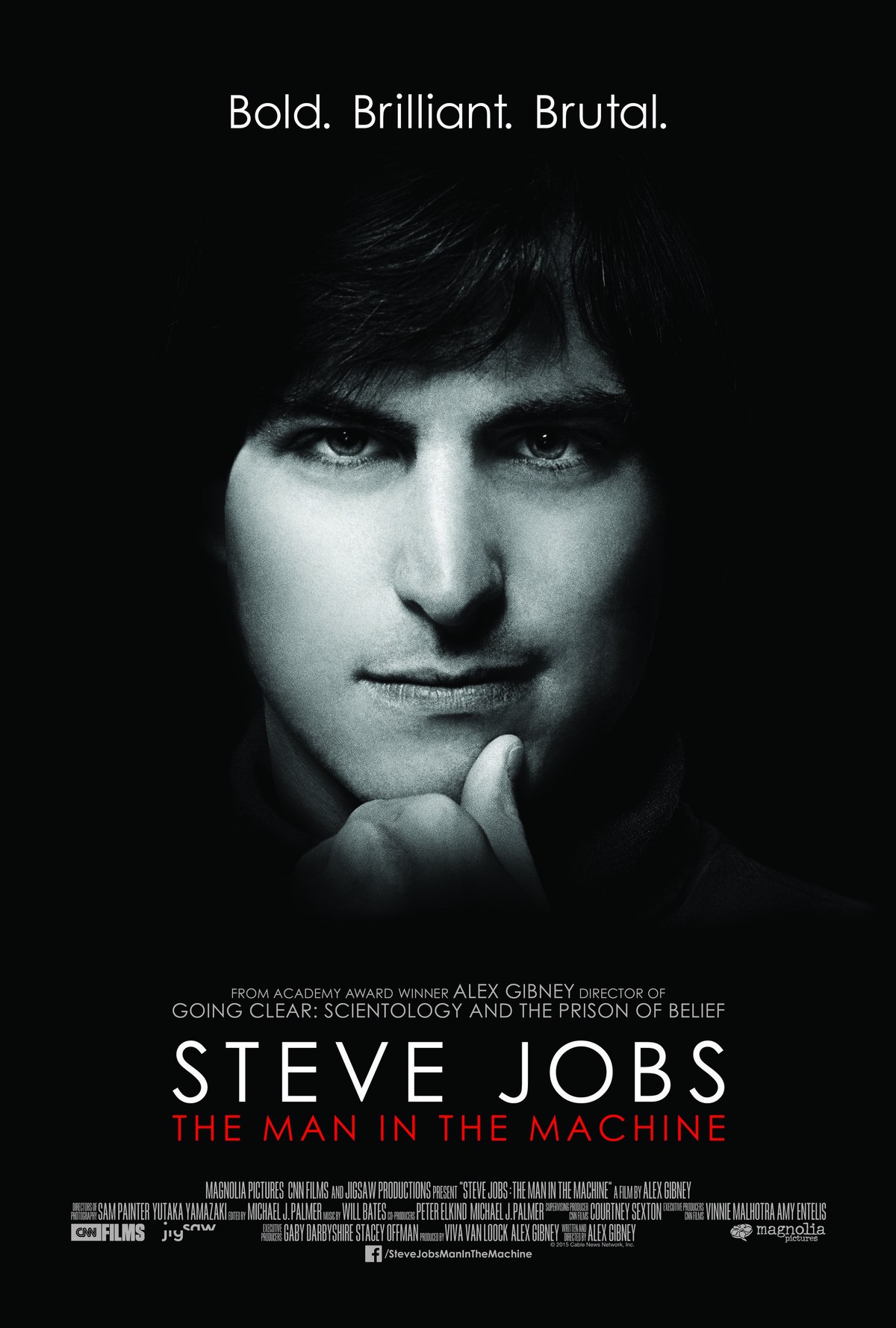
Director ? Alex Gibney
Trailer
As a longtime fan of Alex Gibney?s films, I was really hoping I would like this movie, especially since I usually find that documentaries about real people and events are better than dramatized versions. But as I said in my review of the film, ?The Man In the Machine is focused largely on the thesis that Jobs was always and only a jerk, that people who enjoy Apple products and admire Jobs are idiots and cult members, and that the computer revolution that was born of Jobs? vision must inevitably contain the same ugly darkness Gibney feels is Jobs? defining trait, despite any evidence to the contrary.? The film basically plays out like a Steve Jobs version of what I call the Three Stages of Apple Criticism, with Gibney starting with the unshakable belief that Jobs was a monster (even the poster for The Man In the Machine is sinister), then using that as the basis to criticize everything associated with Apple. This includes Apple?s customers, who the film represents with the most extreme, cartoonish fanboys culled from YouTube and lines outside Apple stores.
To establish that Jobs was a world-class heel unworthy of admiration, the film devotes a lot of time to the well-trod topic of Jobs? youthful offenses, like ripping off Wozniak on one of their first projects, working Apple engineers to exhaustion, his penchant for emotional outbursts and harsh insults, and his truly shameful years-long denial that he was the father of his daughter with Chrisann Brennan. Then, as evidence that Jobs was still the same asshole when he returned to Apple in 1997, Gibney makes the stretch that Apple?s ?Think Different? marketing campaign was Jobs? declaration that Apple would conduct business in a radically different way than other large tech companies, even if it reduced their profits. Gibney then chastises Jobs for instances where Apple engaged in activities that, while nothing to be proud of, were understandable and hardly unusual for Silicon Valley, or really any large company.
It was quite a bummer for me that a documentarian I respect so much would put out a hatchet job like this. Ultimately, I think the film is more of a reflection of Gibney?s admitted dislike for the digital age in general than Jobs himself, who Gibney feels is responsible for it.
Read my full review of Steve Jobs: the Man In the Machine here.
For the most part, none of these early attempts to define Jobs? legacy caught fire with audiences or seemed to change the narrative on Jobs? life and work.
One of the biggest challenges in telling Jobs? story is deciding which part of it to focus on, and perhaps the biggest flaw of Jobs, Steve Jobs, and the Man In the Machine is that they spend so much time on Jobs? early years when his immaturity, bad behavior, and inability to run a company and work with others were undoubtedly at their worst. But this period should not define the entirety of Jobs? life any more than any of us would want to be judged only by the first half of our own lives. By most accounts, when Jobs returned to Apple after his ?wilderness? years starting NeXT and Pixar, he had matured greatly as a person and leader. He still had many sharp edges and could be ruthless in his criticism, but he also understood his weaknesses well enough to assemble a top-notch executive team with the combined skillset to compensate for them. And after his horrible treatment of his first daughter and her mother before reconciling with them, Jobs went on to marry his first and only wife and become the devoted father of three children.
Maybe the story of a man who started as a brash, arrogant, often cruel young jerk, gained humility and perspective after the public humiliation of being fired from his own company, then returned to the company as a more mature, focused, collaborative leader seems too obvious and boring for a figure who looms as large as Jobs. If you?re someone who dislikes Apple, their products, and the man responsible for them, it?s easier to dwell on the part of his life that reinforces your preconceptions. Or maybe the life, work, and influence of Steve Jobs is simply too much to be contained in a single movie. Considering the tepid reception these films received, it will probably be a while before someone attempts to tell the story of one of the most influential people in recent history again.
But when it comes to the question of Jobs? legacy and the idea that ?You have no control / Who lives, who dies, who tells your story?, it?s hard not to feel like Jobs might have outsmarted us once last time.
That?s because the true legacy of Steve Jobs may not be the Macintosh, the iPod, the iPhone, or any of the other products Apple released during his lifetime, but Apple itself, the company Jobs co-founded and imbued with his beliefs, values, taste, sensibilities, and priorities.
Still, Jobs understood the dangers of being a slave to the past or the ghost of a fallen leader, having studied the paralysis that set in at Disney after the death of Walt Disney. ?Never ask what I would do. Just do what?s right,? Jobs told Tim Cook as Cook prepared to take over as Apple?s CEO. By allowing Apple to evolve, the company can be a living thing, able to adapt to a future Jobs would never see. It now seems fitting that Jobs? last public appearance was at a Cupertino City Council meeting where he unveiled the plans for the ambitious, futuristic Apple Park ?spaceship? campus. The ring-shaped building will be Apple?s home for the next several decades, steeped in Jobs? and chief design officer Jony Ive?s design philosophy while also recreating, preserving, and welcoming in the idyllic California landscape Jobs loved so much.
In a never-heard-before audio clip that played before the iPhone X event in 2017, which was also the first event to be held at the just-finished Steve Jobs Theater, Jobs is heard saying, ?We need to be true to who we are and remember what?s really important to us. That?s what?s going to keep Apple Apple: is if we keep us us.? As long as Apple continues to exist and adapt while staying true to its core DNA, the company and the men and women who comprise it will continue to both celebrate, continue, and define Jobs? legacy.
So maybe Hamilton?s Washington is correct, but with a caveat. Jobs certainly can?t control what movies or books say about him, or the spin they?ll put on his life, career, and accomplishments. But Jobs doesn?t need them to do it, because he created something that will not only tell his story, it will ensure that his story isn?t finished.


